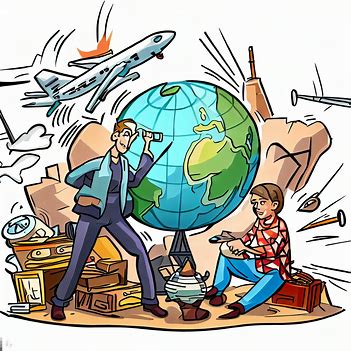Geopolitics and Its Impact on Everyday Lives
Introduction

Geopolitics is the study of the influence of geography, economics, and politics on international relations and the behavior of nations. It examines how geographical factors, such as location, natural resources, and access to waterways, can shape the political and economic interactions between countries. Geopolitical decisions made by governments and international organizations can have far-reaching effects on the lives of ordinary people, influencing everything from economic opportunities to security and cultural exchange.
Resource Distribution and Economic Stability
Geopolitical considerations play a significant role in determining access to valuable natural resources such as oil, gas, minerals, and water. Control over these resources can impact economic stability, trade relationships, and energy prices, ultimately affecting the cost of living for people worldwide.
Trade and Commerce
Geopolitics influences trade policies, tariffs, and international agreements. It can lead to the establishment of trade blocs or alliances, which can either promote or hinder the flow of goods and services. These decisions directly impact the availability and affordability of products for consumers.
Security and Conflict
Geopolitical tensions can lead to regional or global conflicts, affecting civilians' safety and well-being. Armed conflicts and wars disrupt societies, displace people, and lead to humanitarian crises, with innocent civilians often bearing the brunt of violence and instability.
Migration and Refugees
Geopolitical events, such as wars, political instability, and economic hardships, can trigger mass migrations and refugee crises. Millions of people are forced to leave their homes in search of safety and better opportunities, impacting both the migrants' lives and the countries that receive them.
Cultural Exchange and Diplomacy
Geopolitics can influence cultural exchange programs, diplomatic relations, and international cooperation. These interactions can promote mutual understanding and appreciation among diverse cultures, fostering peaceful coexistence.
Technological Advancements
Geopolitical competition can drive countries to invest in technological advancements and innovation. This race for supremacy in fields like artificial intelligence, cybersecurity, and space exploration can lead to new technologies that shape the everyday lives of people worldwide.
Environmental Concerns
Geopolitical decisions impact environmental policies and cooperation. Climate change, pollution, and natural disasters often transcend national boundaries, necessitating international collaboration to address these global challenges.
Human Rights and Global Governance
Geopolitical decisions influence human rights practices and global governance. International organizations and agreements play a crucial role in safeguarding human rights and promoting social justice on a global scale.
Access to Education and Opportunities
Geopolitical decisions can impact access to education, scholarships, and international exchange programs. These opportunities can broaden horizons and empower individuals to positively impact their communities and the world.
Conclusion
In conclusion, geopolitics is not just a realm of governments and diplomats; it profoundly affects the lives of everyday people. The decisions made at the geopolitical level can influence economic stability, security, cultural exchange, technological advancements, and access to resources and opportunities. Understanding geopolitics empowers individuals to be informed citizens and advocates for positive change in a globalized world.
